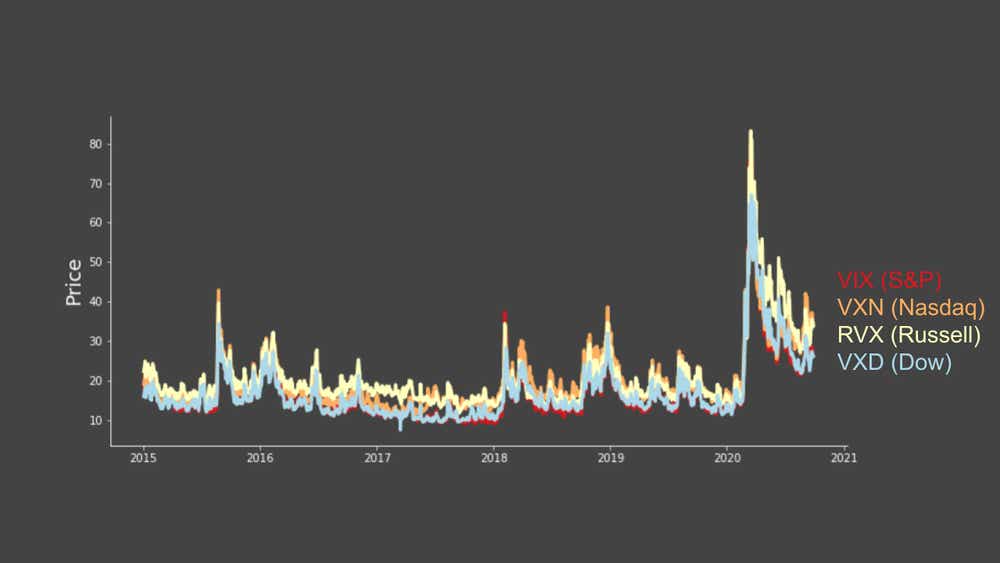Exploring Index Correlations for Smarter Investments

Exploring Index Correlations for Smarter Investments
By:Kai Zeng
Understanding correlations among major indexes and the implications for options strategies is crucial.
The behavior of the S&P 500 (SPY), NASDAQ 100 (QQQ), Russell 2000 (IWM), and Dow Jones Industrial Average (DIA) provides insights into market dynamics and opportunities for diversifying portfolio risks.
During the past decade, the average long-term correlation between each pair of the four main indexes stood impressively high at 0.83, indicating a strong relation in their movements.
However, the IWM and QQQ demonstrated the lowest correlation, slightly under 0.75, suggesting a slight divergence in their performance paths.
This underscores the nuanced relationships that exist among indexes, which can have significant ramifications for portfolio diversification strategies.

Moreover, the implied volatilities (IVs) of these indexes typically exhibit a unified front, moving in tandem within a similar range.
This collective behavior further indicates the deeply interconnected nature of these major markets, with the Dow's IV showing a slightly weaker correlation against others, providing a marginally independent volatility perspective.


Positive correlation poses a challenge
So, what about when we apply the same option strategies across these indexes? A closer examination into the 45-day, 1 standard deviation (SD) strangles on SPY, QQQ, IWM, and DIA sheds light on the correlation in the performance (P/L) of these strategies across different indexes.
The data suggests that the performances of options strategies across these indexes are also positively correlated. This poses a challenge for traders aiming to employ a uniform strategy across these products as a means of achieving portfolio diversification.
The findings highlight a fundamental takeaway: trading the same options strategy on these highly correlated indexes may not yield the desired diversification effect. Since all four indexes—and by extension, their options performances—show high correlations, traders may find it challenging to mitigate risk through traditional diversification strategies within these instruments.
.png?format=pjpg&auto=webp&quality=50&width=1000&disable=upscale)
Seek uncorrelated entities
To navigate this interconnected market environment, traders should consider looking beyond these correlated entities. Seeking out uncorrelated assets or employing a varied mix of strategies and deltas can offer a more robust approach to diversification. This could involve exploring different financial instruments, market sectors, or even international markets that do not move in lockstep with the major U.S. indexes.
In conclusion, while the major indexes offer a snapshot of market sentiment and trends, their high correlations—both in stock movements and option performances—present a challenge for diversification. By understanding these dynamics and exploring beyond the conventional boundaries, traders can enhance their risk management techniques and strive for a more diversified and resilient portfolio.
Kai Zeng, director of the research team and head of Chinese content at tastylive, has 20 years of experience in markets and derivatives trading. He cohosts several live shows, including From Theory to Practice and Building Blocks. @kai_zeng1
For live daily programming, market news and commentary, visit tastylive or the YouTube channels tastylive (for options traders), and tastyliveTrending for stocks, futures, forex & macro.
Trade with a better broker, open a tastytrade account today. tastylive, Inc. and tastytrade, Inc. are separate but affiliated companies.
Options involve risk and are not suitable for all investors. Please read Characteristics and Risks of Standardized Options before deciding to invest in options.
tastylive content is created, produced, and provided solely by tastylive, Inc. (“tastylive”) and is for informational and educational purposes only. It is not, nor is it intended to be, trading or investment advice or a recommendation that any security, futures contract, digital asset, other product, transaction, or investment strategy is suitable for any person. Trading securities, futures products, and digital assets involve risk and may result in a loss greater than the original amount invested. tastylive, through its content, financial programming or otherwise, does not provide investment or financial advice or make investment recommendations. Investment information provided may not be appropriate for all investors and is provided without respect to individual investor financial sophistication, financial situation, investing time horizon or risk tolerance. tastylive is not in the business of transacting securities trades, nor does it direct client commodity accounts or give commodity trading advice tailored to any particular client’s situation or investment objectives. Supporting documentation for any claims (including claims made on behalf of options programs), comparisons, statistics, or other technical data, if applicable, will be supplied upon request. tastylive is not a licensed financial adviser, registered investment adviser, or a registered broker-dealer. Options, futures, and futures options are not suitable for all investors. Prior to trading securities, options, futures, or futures options, please read the applicable risk disclosures, including, but not limited to, the Characteristics and Risks of Standardized Options Disclosure and the Futures and Exchange-Traded Options Risk Disclosure found on tastytrade.com/disclosures.
tastytrade, Inc. ("tastytrade”) is a registered broker-dealer and member of FINRA, NFA, and SIPC. tastytrade was previously known as tastyworks, Inc. (“tastyworks”). tastytrade offers self-directed brokerage accounts to its customers. tastytrade does not give financial or trading advice, nor does it make investment recommendations. You alone are responsible for making your investment and trading decisions and for evaluating the merits and risks associated with the use of tastytrade’s systems, services or products. tastytrade is a wholly-owned subsidiary of tastylive, Inc.
tastytrade has entered into a Marketing Agreement with tastylive (“Marketing Agent”) whereby tastytrade pays compensation to Marketing Agent to recommend tastytrade’s brokerage services. The existence of this Marketing Agreement should not be deemed as an endorsement or recommendation of Marketing Agent by tastytrade. tastytrade and Marketing Agent are separate entities with their own products and services. tastylive is the parent company of tastytrade.
tastyfx, LLC (“tastyfx”) is a Commodity Futures Trading Commission (“CFTC”) registered Retail Foreign Exchange Dealer (RFED) and Introducing Broker (IB) and Forex Dealer Member (FDM) of the National Futures Association (“NFA”) (NFA ID 0509630). Leveraged trading in foreign currency or off-exchange products on margin carries significant risk and may not be suitable for all investors. We advise you to carefully consider whether trading is appropriate for you based on your personal circumstances as you may lose more than you invest.
tastycrypto is provided solely by tasty Software Solutions, LLC. tasty Software Solutions, LLC is a separate but affiliate company of tastylive, Inc. Neither tastylive nor any of its affiliates are responsible for the products or services provided by tasty Software Solutions, LLC. Cryptocurrency trading is not suitable for all investors due to the number of risks involved. The value of any cryptocurrency, including digital assets pegged to fiat currency, commodities, or any other asset, may go to zero.
© copyright 2013 - 2025 tastylive, Inc. All Rights Reserved. Applicable portions of the Terms of Use on tastylive.com apply. Reproduction, adaptation, distribution, public display, exhibition for profit, or storage in any electronic storage media in whole or in part is prohibited under penalty of law, provided that you may download tastylive’s podcasts as necessary to view for personal use. tastylive was previously known as tastytrade, Inc. tastylive is a trademark/servicemark owned by tastylive, Inc.